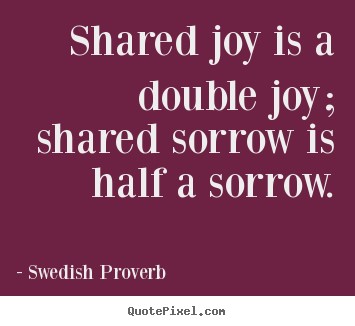First some pastoral humor …
A pastor visits an elderly woman from his congregation. As he sits on the couch, he notices a large bowl of peanuts on the coffee table. “Mind if I have a few?” he asks.
“No, not at all!” the woman replies.
They chat for an hour and as the preacher stands to leave, he realizes that instead of eating just a few peanuts, he emptied most of the bowl. “I’m terribly sorry for eating all your peanuts, I really just meant to eat a few.”
“Oh, that’s all right,” the woman says. “I can’t eat peanuts anyway. Ever since I lost my teeth all I can do is suck the chocolate off of them.”
Oops.
And now for my word … SHARED …

The Apostle Paul said: Rejoice with those who rejoice, and weep with those who weep. (Romans 12:15)
The word “shared” makes all the difference. It increases our joy and reduces our sorrow.
I spent too many years keeping my difficulties and sorrows to myself. There are others around us that don’t mind sharing our load a little bit. And there are certain friends and family who not only don’t mind being supportive – they really want to share our load, because they care.
Jesus said: Blessed are those who mourn, for they shall be comforted. (Matthew 5: 4)
Do you resist letting others share in your sorrows? I’ve had church members in the past who didn’t want anyone to know when they went into the hospital or had difficult burdens, such as wayward children, lost jobs, or financial struggles. Something in our culture and in human nature resists telling others the difficulties we face. But God is not pleased in our secretiveness. If we desire for the love of God to come in and bless us, then we must change our approach – listen to others’ burdens that we may lighten their load – and share our burdens that others may lighten ours.
As for shared joys, I find it interesting that when people in church are asked to share their prayer concerns, joys, and sorrows, it is likely that there will be ten concerns shared, and then a silence. Everyone is having a hard time thinking of some good news to share – anything that would make us smile or shout for joy. I wish I had a catchy phrase to explain how to overcome this. I think our culture in general, and our churches in particular, have a hard time experiencing true joy.
The 23rd Chapter of Leviticus is entitled, “Feasts of the Lord.” And God says, “These are My feasts” – Sabbath, Passover, the Feast of Firstfruits, the Feast of Weeks, the Feast of Trumpets, the Day of Atonement, and the Feast of Tabernacles – seven in all. The routines of the working world were set aside for many days, and celebration took place. There were serious days, yes, but then there was dancing, singing, storytelling, and thankfulness for the goodness of God.
It is sad that the church over the centuries has lost much of the celebratory spirit of the faith. God wants us to know how to have a good party – where joy and laughter abound, where God is at the center while his people enjoy the life he has given.
Sharing our joys and sorrows as Christians means acknowledging that God is right there in the middle of it all – he is the giver of good gifts that bring joy, and he is our comfort in times of sorrow. Sharing it with one another multiplies the blessings and divides the sorrows.
Blessings,
Chaplain Mark